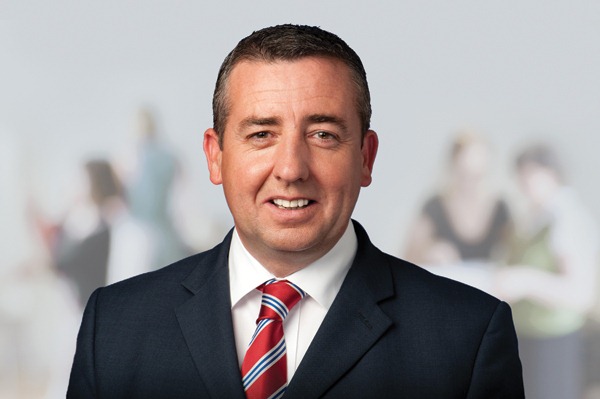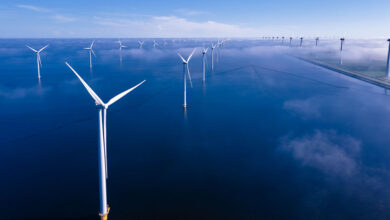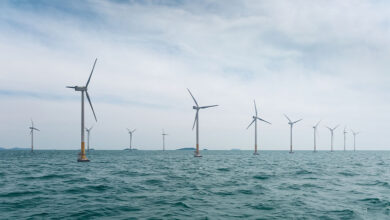A New Environment: Ciarán Lynch
In the first in a series of interviews with Oireachtas committee chairs, Stephen Dineen talks to Ciarán Lynch about the Committee’s work.
Ciarán Lynch does not claim to be an expert on the environment, but says he’s a quick learner. In the changed political world of the 31st Dáil, and a reformed committee system, he has the perfect storm. Where Oireachtas committees in the last Dáil usually had less than
20 members and met every couple of weeks, the new 27-member Committee on Environment, Transport, Culture and the Gaeltacht, of which he is chair, meets at least once a week and has on occasion met four times in a week.
It’s been “quite challenging” the Labour TD for Cork South Central tells eolas. “The committee covers three different departments, three ministers and five junior ministers. Each have their own competing demands and the committee has to deal with everything. Legislation covers over half the work programme.”
Apart from the amount of time that being a Chair requires, Lynch also has to deal with accommodating more members. “Sometimes in politics it’s not that everything has not been said already,” he smiles, “it’s a case that not everybody has said something.” Lynch believes the committee is working well. The Chair says it is his goal that “the committee doesn’t reflect the adversarial nature of the main chamber.”
Lynch seems satisfied with some of the new system’s manifestations. Ministers now consult the relevant committees on the contents of bills before they are published. Lynch and his colleagues experienced this in July when Transport Minister Leo Varadkar appeared before them on the day the general scheme of the Road Traffic (No. 2) Bill was published. The committees listened to his outline, made comments and deliberated before producing a report with recommendations for the Bill. The process took approximately three weeks.
The committee’s recommendations included:
• an examination of possible loss of revenue and staff by local authorities due to the proposed centralisation of the driving licence system;
• clarification from the Attorney General about the constitutionality of taking a blood specimen from an unconscious driver who is not in the vicinity of the suspected crime;
• appropriate safety standards as well as proper verification and auditing procedures for commercial vehicle roadworthiness testing;
• a reduced fine for early payment of penalty charge notices (parking tickets); and
• penalty points for illegal dumping of cars.
In his speech opening the second stage debate on the Bill in the Seanad the Minister said he will publish another Road Traffic Bill “to address the other issues [apart from mandatory breath testing at the new, lower blood alcohol limits] discussed with and raised by the committee.”
As chair Lynch is responsible for collating the recommendations. “My job as chair is not to place a value judgement on the recommendations, quite the opposite in fact,” he states. He believes the process of sub-committees examining particular areas will evolve.
Priorities
The committee’s work plan for the rest of this year includes water provision, housing, the taxi and private bus sectors and the economic duties of Údarás na Gaeltachta.
Ministers are now expected to brief committees before and after EU Council of Ministers meetings.
“Water, for me, would be the number one priority,” says Lynch. “It’s critical that we have a water supply in this country, a costing of it, quality assurances for it, and also that we deal with issues concerning guarantee of supply.”
Guarantee of supply has motivated the committee’s examination of Bord na Móna’s proposal to extract water from the Shannon at peak flow to a reservoir on the Garrynahinch bog, near Portarlington, to treat and store it before supplying it to Dublin and its surrounding region. Bord na Móna has appeared before the committee. Lynch and colleagues visited the proposed site in July. More experts will give evidence to the committee before it publishes its report.
Another water policy proposal Lynch highlights is for rainwater harvesting systems to be “part of the planning norm” for housing. He says it is one example of a “stand-alone idea” the committee can focus on, which, combined with a compliment of other measures, could “add up to a far greater sum.”
Lynch expects other environmental priorities to include waste management and the difficulties in the housing sector such as ghost estates and problems pertaining to tenant purchasing and social housing.
Among the representations the new committee has received are those from the Union of Students in Ireland (to discuss rental deposit protection), organisations interested in fracking (a method of extracting gas from rock layers using pressurised fluid), waste management organisations and arts groups.
The work of Lynch’s committee, however, is partly contingent on the Government’s priorities. The new administration’s “immediate range of sight issues are the legacy matters arising from the initial ‘troika’ agreement,” and its content such as household and water charges.
“The view is: ‘let’s set up the structures to deal with these requirements; let’s get the first budget out of the way and then we’ll move on to the long-term issues,’” Lynch states.
Communication
Fundamental to the work of the committee, Lynch concedes, is communicating what is relevant to the public. A tested and successful method, he believes, is for committees to visit sites or people “rather than wait for somebody to come and tell you what the site is, on a Powerpoint presentation.”
He believes that TDs must “begin with the premise that not everybody has to come to the Dáil but that the Dáil sometimes has to go to the people.” When an Oireachtas committee visits a provincial town “it becomes a big news story.” Such visits “create awareness of how the Oireachtas works in general, and gives it specific relevance to the type of work that the committee is doing in that area.”
On the dual challenge of policy work and communication he analogises: “The policy is the manufacturing of the product; and then there’s the retailing of the policy.”
For example, “sound environmental policies need to be linked with both an economic and social dividend so that there is an opportunity for Ireland to engage with this as part of the broader recovery process.”
Reforms
Ciarán Lynch is originally from Ballyphehane, County Cork, and studied social studies at UCC and humanities at Waterford Institute of Technology. Before politics he worked as an adult literacy organiser for Cork VEC. He was first elected a county councilor in 2004, and was then elected to Dáil Éireann for Cork South Central at his first attempt in 2007. Between 2007-2011 he was Labour’s spokesman on local government and housing. Married with two children, when time permits he enjoys fishing, walking and travelling, as well as what he calls “hamburger television” which he describes as “some bit of fluffy nonsense for about forty minutes,” after a day’s work.






